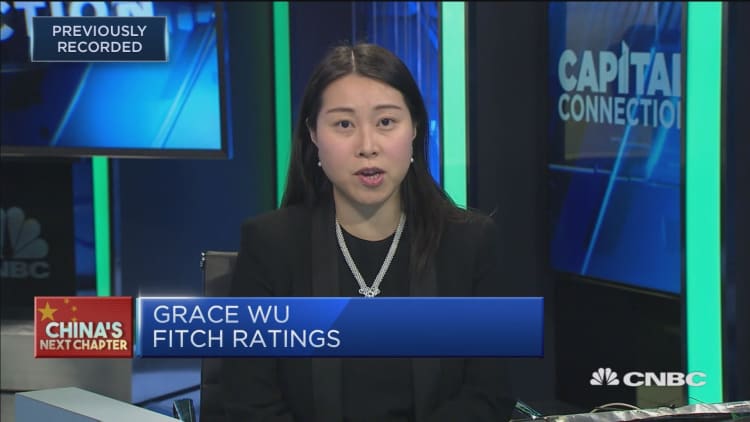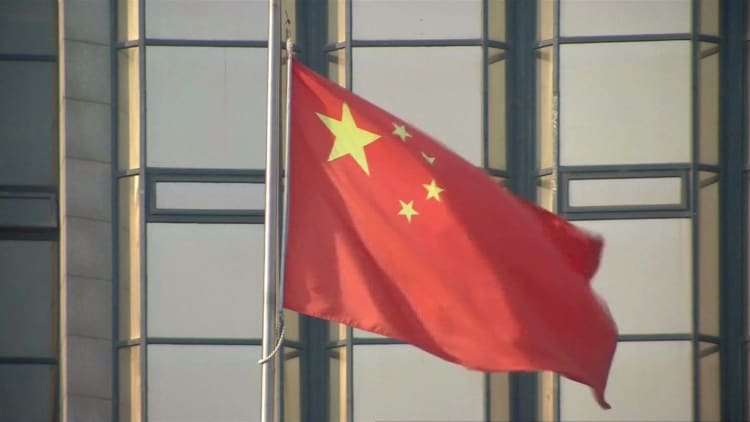Things aren't so bad for the Chinese banks right now: The frequently maligned companies have seen their shares soaring and their businesses improving. But things may actually get even better.
That is, several financial metrics are now pointing to the prospects of higher banking profits following a nationwide clampdown on swelling debt — and investors are paying attention.
Shares of the country's big four banks have rallied for most of this year on anticipated improvements in their debt holdings and margins. The largest bank, Industrial and Commercial Bank of China, was the top performer after its Hong Kong-listed shares surged by more than 30 percent in the first 10 months of the year. The other three major banks, China Construction Bank, Agricultural Bank of China and Bank of China, also fared well with jumps of between 9 percent and 18 percent.
Yet, their shares are still trading at a discount compared to many of their peers in the U.S., Europe and Japan, analysts said, adding that brighter prospects ahead mean Chinese banks could still trend higher — making them an attractive investment.

As debt risks recede with Beijing's heavy-handed approach and a "resilient" Chinese economy, "we see China banks likely facing a smoother credit cycle vs. global peers," Nomura analysts wrote in a report in October when they turned positive on the sector after 12 months of staying cautious.
The banking sector in the Asian economic giant is the largest in the world by assets, according to a Financial Times analysis earlier this year. The health of China's lenders is closely-watched as a proxy for the country's wider economy, which has global implications.
As indebtedness grew rapidly in China over the past few years, Chinese banks' ability to control risks was questioned and regulators intervened on fears of instability breeding turmoil. Now, that effort appears to be paying off.
"It's indisputable that asset quality is getting better in China. When the economy is doing so well and so many corporations are making money versus losing money previously, inevitably the asset quality has to get better," Helen Zhu, BlackRock's head of China equities, told CNBC.
Zhu's comments were backed by the top four banks' latest quarterly report cards, which all showed a decline in the proportion of bad debt to total loans. On average, that proportion stood at 1.61 percent across the major lenders in January-to-September 2017 versus 1.76 percent a year ago, according to an analysis by Nomura.
That improvement came on the back of a "successful financial deleveraging" in China, noted Nomura analysts. They wrote in a Tuesday report that the second-largest economy in the world saw a decline in leverage in the third quarter this year. That was the first decline since 2008, they said, pointing to several indicators:
- The ratio of M2 — a category of an economy's money supply that includes cash, checking deposits, savings deposits, money market securities, mutual funds and time deposits — to GDP fell from a peak of 2.14 in June to 2.09 in September. A decline in M2 indicates less consumption, lending and borrowing.
- The ratio of total social financing (TSF, a measure of credit and liquidity) to GDP edged down from its eight-year peak of 2.19 in June to 2.16 in September. A TSF decrease points to a less fundraising, which can be in the form of debt.
Interest rates in China are going up from "abnormally low levels" last year, so banks are less inclined to add debt to their balance sheet, the Nomura analysts wrote. In fact, they added, that change in rates is favorable for "a further deepening of deleveraging."
The rising rates environment is also benefiting the banks in another way: net interest margin (NIM), the measure of lending profitability, has shown signs of picking up. The average NIM across the big four banks was at 2.11 percent by the end of September, similar to last year's but higher than the 2.06 percent seen in the first quarter of 2017, according to Nomura.

Analysts said all of those indicators signal that the banks will register higher profits in the years ahead after more than two years of flat earnings. Those predictions come even as some warned of risks from the still-high debt levels, stresses from a prolonged deleveraging process and a property market that may become overheated.
"I think financial institutions' fundamentals are certainly getting better," Zhu said. BlackRock, the largest asset manager in the world, has an "overweight" rating on China's financials, which include banks and insurance companies.
"The Chinese equity market has been out of favor for a number of years. Foreign investors have so many concerns: the debt, the overcapacity, the environment, the corruption or the wealth disparity. Even though growth was good, people thought these issues were getting worse so valuations kept going down. Now, for the first time in many years, we actually see structural changes happening," she added. "I think China's growth rate will just be stable, but on the other hand, earnings could still rise upwards."
WATCH: Sanctions against Chinese bank may be best way to rein in North Korea



